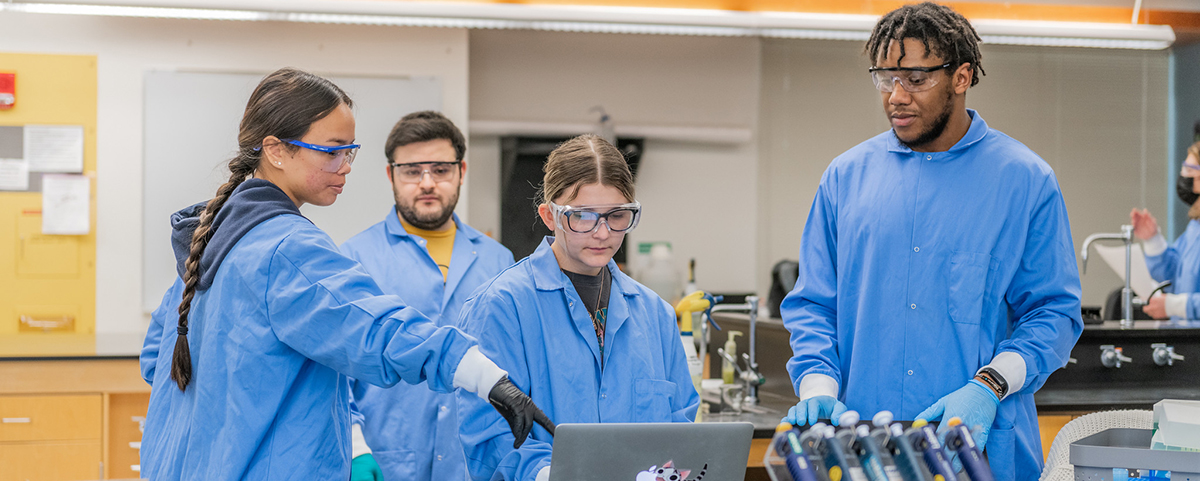Chemistry Major
The chemistry program at Cabrini is designed to prepare chemistry majors for successful careers in a variety of industries and professions including the pharmaceutical industry, biotechnology, medicine, academics, secondary education, government, as well as other chemistry-related fields.
Students seeking a bachelor of science degree in chemistry are required to take courses including General Chemistry, Organic Chemistry, Analytical Chemistry, Instrumental Chemistry, Biochemistry, Physical Chemistry, Physics, Calculus, a Senior Seminar and an Internship or research project.
Chemistry majors also are required to take one chemistry elective from a selection of courses which includes Inorganic Chemistry, Biochemistry II, Combinatorial and Computational Chemistry, Advanced Organic Chemistry, Organic Spectroscopy, and Environmental Chemistry.
At Cabrini, students who choose to major or minor in chemistry will receive a strong foundation and comprehensive education in chemistry that is necessary for a successful career.
They will have the opportunity to meet with faculty to discuss their concerns and to answer questions regarding course material, career choices, or any aspects of chemistry that interest them.
Students should begin coursework towards the major or minor no later than the first semester of their sophomore year. Failing to do so may prevent them from completing the necessary requirements or require students to do coursework during the summer.
Requirements for the Major in Chemistry
(all courses 4 credits unless noted)
- CHE 111 - General Chemistry I
- CHE 112 - General Chemistry II
- CHE 201 - Analytical Chemistry (3 credits)
- CHE 211 - Organic Chemistry I
- CHE 212 - Organic Chemistry II
- CHE 303 - Inorganic Chemistry (3 credits)
- CHE/BIO 315 - Introduction to Scientific Presentations (1 credit)
- CHE 401 - Physical Chemistry I
or
CHE 402 - Physical Chemistry II - CHE 407 - Instrumental Analysis
- CHE/BIO 440 - Biochemistry I
- CHE/BIO 444 - Senior Seminar (3 credits)
- CHE 488/ R‑CHE 466/ SEC 490 - Internship/ Undergraduate Research/ Student Teaching
- CHE Elective 200-level or higher
excluding CHE 444, 488, 489, or 499 (3-4 credits) - MAT 131 - Calculus II
Total credits for major: 49-50
- Students must take PHY 111-112 (with laboratories, 8 credits) as their Scientific literacy requirement for the Core.
- Majors must also take MAT 130 as a quantitative literacy course or as a free elective.
- No courses used towards the Chemistry major may be taken under the pass/fail option.
Learning Outcomes
Chemistry majors will:
- understand foundational biological, chemical, and physical science concepts, as emphasized in the core science course requirements (Biochemistry; Genetics; Cell Biology; Molecular Biology; Organic Chemistry; Physical Chemistry)
- demonstrate the ability to apply the scientific method and will possess problem solving skills necessary to design, conduct, and troubleshoot experiments and to test a hypothesis
- focuses on the critical thinking and analytical skills necessary to read, understand, and critically review scientific papers and to interpret and analyze data presented in various forms (i.e. graphs, tables, narrative)
- develop written and oral communication skills necessary to present scientific ideas to multiple audiences using the accepted format of the discipline
- acquire basic proficiency in computational skills, lab techniques, and use of technology (i.e., lab equipment, specialized computer hardware and software) necessary for entry into the science workplace or graduate/professional schools
